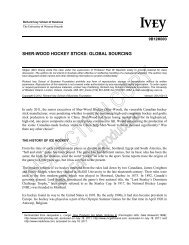foundation of canada asia pacific - Content Tagged with
foundation of canada asia pacific - Content Tagged with
foundation of canada asia pacific - Content Tagged with
Create successful ePaper yourself
Turn your PDF publications into a flip-book with our unique Google optimized e-Paper software.
stock markets were climbing. As the year progressed, so did the affected economies, <strong>with</strong><br />
the result that over the 12 months all but Indonesia recorded growth. Even in Indonesia<br />
the marginal decline marked a sharp turnaround from the 13.7% contraction <strong>of</strong> the previous<br />
year. While the recovery is welcome and likely to continue, there are still some challenges<br />
to overcome before the region can earn a clean bill <strong>of</strong> health. For one, there has been a<br />
significant increase in the direct involvement <strong>of</strong> governments in the affected economies,<br />
which will tend to squeeze out private investment in the next few years. Beyond that, the<br />
swift return to growth masks continuing financial weaknesses in Asian companies.<br />
For the 15 years prior to 1997, governments in much <strong>of</strong> East and Southeast Asia were<br />
pulling back from a direct role in industry (China and Vietnam being the exceptions).<br />
State-owned companies were steadily privatized, leaving the private sector greater freedom<br />
to get on <strong>with</strong> business. There were exceptions: governments maintained direct ownership<br />
<strong>of</strong> one or more banks in most countries, generally kept a stake in some utilities, and<br />
retained ownership <strong>of</strong> key industries such as oil production (in Malaysia and Indonesia)<br />
or automobile manufacturing (Malaysia). While they moved away from direct ownership,<br />
governments adhered to growth-oriented economic policies, and <strong>of</strong>ten set explicit<br />
goals for industries. But in combatting the crisis set <strong>of</strong>f by the devaluation <strong>of</strong> the Thai baht<br />
in July 1997, governments were forced to take back ownership or control <strong>of</strong> a vast range<br />
<strong>of</strong> companies, especially in the key financial sectors.<br />
23<br />
During 1997-98, the four most seriously affected economies — South Korea, Thailand,<br />
Indonesia and Malaysia — had to inject a combined US $78 billion <strong>of</strong> public funds into<br />
their banking systems to sustain liquidity and bolster public confidence, and to keep<br />
28 Indonesian President Habibie <strong>of</strong>fers East<br />
Timor independence or autonomy.<br />
29 Hong Kong’s highest court rules that mainland<br />
Chinese children <strong>with</strong> parents living in Hong<br />
Kong have right <strong>of</strong> abode in SAR.<br />
29 Independence supporters and opponents<br />
clash in East Timor after Jakarta <strong>of</strong>fers choice<br />
on independence.<br />
FEBRUARY<br />
08 Philippine government and Moro Islamic<br />
Liberation Front begin peace talks to end<br />
insurgency in Mindanao.<br />
09 About 1,700 Khmer Rouge guerrillas join<br />
Cambodian army.<br />
09/ Three-day national strike paralyzes Bangladesh,<br />
11 <strong>with</strong> six people dead and 200 injured.<br />
18 Indonesian government passes antimonopoly<br />
bill which will impose sanctions<br />
on anti-competitive business practices.<br />
19 World Bank approves US $210 million loan<br />
to India for power generation program, first<br />
non-humanitarian loan since India’s nuclear<br />
tests in May 1998.<br />
20 First bus service between India and Pakistan<br />
in 50 years arrives in Pakistan <strong>with</strong> Indian<br />
Prime Minister A.B. Vajpayee a passenger.<br />
25 South Korea releases more than 1,500<br />
prisoners to mark President Kim Dae-Jung’s<br />
first year in <strong>of</strong>fice.<br />
26 Sultan <strong>of</strong> Selangor, Salahuddin Abdul Aziz<br />
Shah, elected king <strong>of</strong> Malaysia.<br />
MARCH<br />
02 Former Malaysian chief <strong>of</strong> police admits<br />
assaulting former Malaysian Deputy Prime<br />
Minister Anwar Ibrahim after his arrest.<br />
02 Philippine President, Joseph Estrada, ends<br />
peace talks <strong>with</strong> communist rebels, <strong>with</strong>draws<br />
immunity from guerrilla negotiators<br />
after army <strong>of</strong>ficers and policeman kidnapped.



